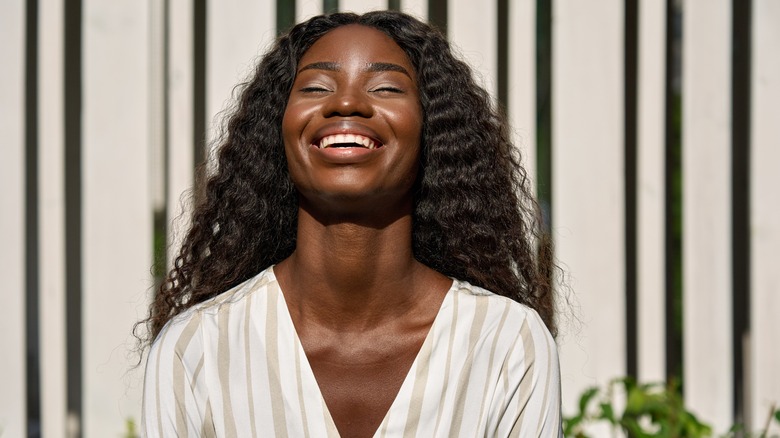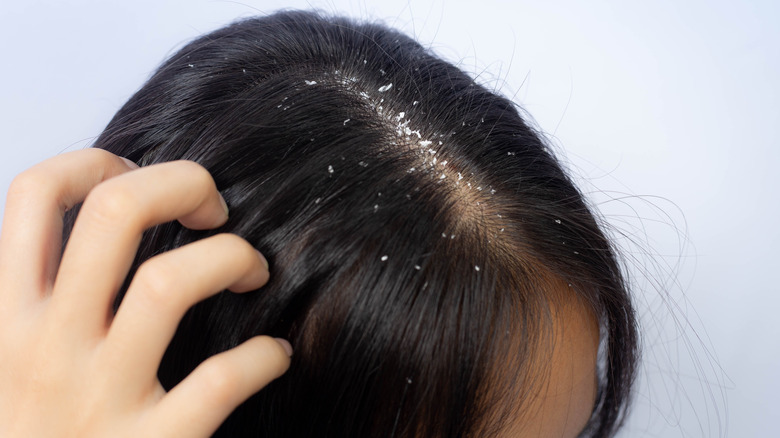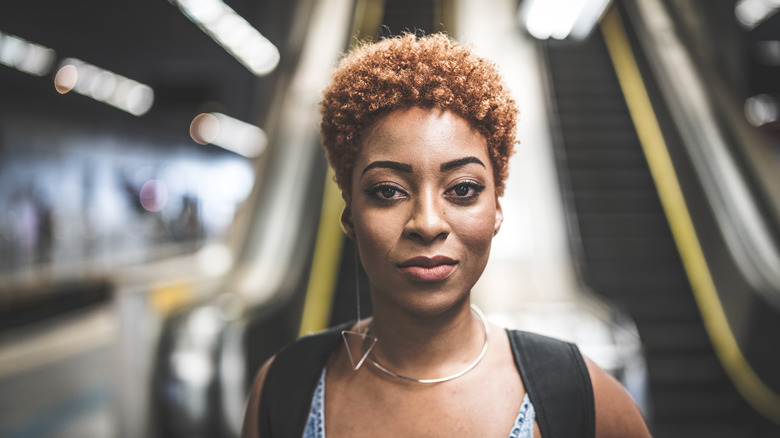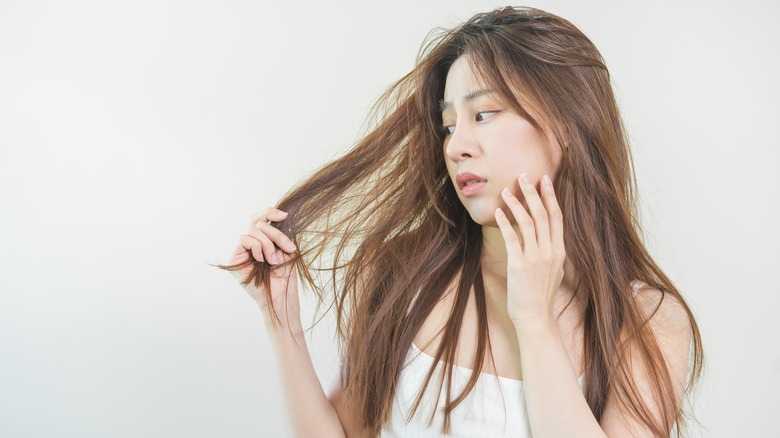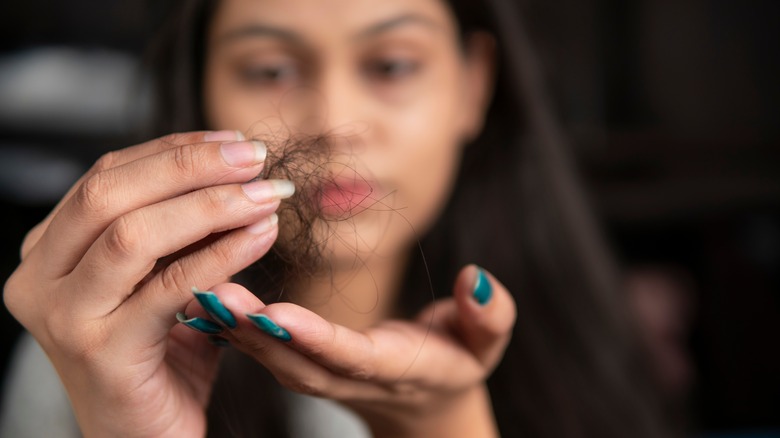What Apple Cider Vinegar Can (And Can't) Do For Your Hair Health
By now you've probably heard of the wonders that apple cider vinegar (ACV) can apparently do for your hair. From adding shine to increasing hair growth, it's hard to keep track of just what apple cider vinegar has been credited with. If you're someone who hasn't yet taken the dive into ACV haircare, you might be wondering just how many of these purported benefits are actually true. It can be difficult to know if apple cider vinegar might be right for you, or if your hair type might have better luck with another kitchen hair hack like, say, rice water.
For those who might not know, apple cider vinegar is made from (you guessed it) apples. Like most kinds of vinegar, a carbohydrate (in this case, apples) is smashed up and fermented. During fermentation, sugars are broken down by bacteria and yeast before being converted into acetic acid, aka vinegar. This acidity is what makes it such a powerhouse for hair.
However, like with all supposed cure-alls, there is usually a grain of salt (or two) to be had when considering whether to give them a try. While apple cider vinegar can definitely have some hair benefits, by no means is it a miracle worker. Plus, certain hair types might not get the results they are looking for. Let's dive into some of the things ACV can do for you, and a few things it can't.
ACV can help your scalp
Certified trichologist and founder of Root Cause Scalp Analysis, Bridgette Hill, told Elle, "ACV neutralizes and supports the natural biome of the scalp. Apple cider vinegar has antimicrobial properties to cleanse and natural alpha hydroxy acids that gently exfoliate to encourage cellular turnover and create an optimal environment for hair to grow." As a hair rinse, apple cider vinegar can function much like a clarifying shampoo which can be helpful for those dealing with product build-up and those with unbalanced scalp environments (oily or dry).
Plus, ACV's antibacterial and antifungal properties can be a game changer for anyone suffering from psoriasis or other chronic scalp conditions (for instance, its acidity helps to combat the yeast build-up that can lead to dandruff). As an added bonus, apple cider vinegar can also help to calm any potential flare-ups while balancing your scalp's pH levels. This soothing effect can be worth the weird smell.
ACV can preserve your hair color
Finding something that can cleanse your hair without stripping your color can be especially difficult. This is where apple cider vinegar shines. Bobby Michael, hairstylist and co-owner of Manhattan's Maverick House salon told Elle, "On the hair shaft, ACV closes the cuticle, sealing in moisture and adding optimal shine." This sealing process at the hair's cuticle better protects your hair color from fading. This can be especially important for those with brighter colors, or anyone who jumped on the red hair trend this summer since these colors can be more prone to fading than others.
Not only does this sealing add shine and help preserve your color but it also reduces breakage along the hair shaft. This both minimizes frizz and allows the elasticity of your hair strands to remain intact. This combo can be important for overall hair texture since it can lead to softer (and much stronger) hair. Plus, this can cut down the time you have to spend detangling.
ACV can't repair all damage
While apple cider vinegar can absolutely help seal in moisture (thereby reducing breakage and frizz), it can't repair damaged hair (especially breakage). Plus, for those with damaged hair, it might be better to avoid apple cider vinegar altogether. Gregorio Ruggeri, a certified trichologist and creative director of Salon Ruggeri explained to Elle, "Since ACV is acidic, it can be a bit too strong for anyone who has mechanical damage — say from bleaching, excess sun exposure or overusing hot tools — very fine hair that's naturally brittle or anyone who has difficulty growing their mane."
It's important to take a good look at your hair situation to determine if your hair is strong enough to withstand the acidity of apple cider vinegar. Otherwise, not only will you not be getting the perks of using it, but you could actually be causing more damage. Ruggeri did concede, "If your hair is breaking off, you can put ACV onto the roots, but it should never be applied to the ends."
ACV can't make your hair grow
Despite the benefits apple cider vinegar might have on your scalp, there is no evidence that it can lead to hair growth or that it's effective at treating hair loss. However, some argue that apple cider vinegar's ability to balance your scalp's pH and clean away build-up is absolutely conducive to helping prevent additional hair loss. So, while vinegar can't necessarily help you grow more hair, it can be a useful way to help get your scalp and overall hair situation back on track while stopping additional breakage.
It's also important to remember that apple cider vinegar, like all products, should be used in moderation. Overusing a vinegar rinse can lead to damage, dryness, and brassiness for those with colored hair. This can be especially true for those with sensitive skin who might be shocking their scalp in a bad way. The ratio of your rinse can also be a factor for creating an optimum rinse. For instance, if you have dry hair, using a more diluted apple cider vinegar rinse might be a better option than someone with oily hair.
